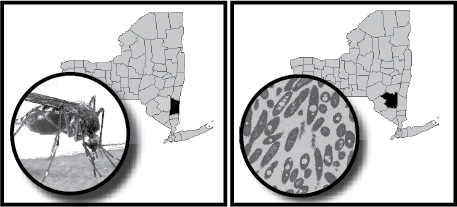
Legionnaires’ Disease Confirmed In Ulster
This past September, two local residents contracted Legionnaires’ disease, a form of pneumonia caused by the legionella bacteria, Dr. Carol Smith, Ulster County health commissioner said.
Legionella is found naturally in the environment, specifically within the soil, Smith said. It is an “opportunistic bacteria,” meaning it affects people with compromised immune systems and respiratory diseases like emphysema, she said. Thus smokers and the elderly are the more susceptible groups.
Smith said it is important to know that Legionnaires’ is not spread from person to person, rather it is mostly contracted from older plumbing and heating systems and is then spread through water vapors from air conditioner drippings, water droplets or spray from showers.
“It’s not communicable that it passes from person to person,” she said. “It can transmit to household members. If you have people contracting it in the building, it could be something with the water system…water perhaps is stagnate or cools down.”
Legionnaires’ creates pneumonia-like symptoms which include coughing, fever and congestion. When a patient complains of pneumonia symptoms, Smith said screening is done for the legionella bacteria and samples are sent to environmental labs. Infected persons are treated with antibiotics.
Ten cases are reported in Ulster County each year, Smith said. The recent outbreaks were contracted in a private facility where elderly people reside. Smith said because the facility is not state owned, the department could not regulate the building. However, the facility reached out to the department for advice about getting rid of the bacteria.
Keeping water at higher temperatures, among other strategies, can kill legionella, Smith said.
“Copper silver ionization systems can eradicate [legionella] in water in the systems which it is placed,” she said. “Super heating water can also remove bacteria from the water supply.”
***
Dutchess Diagnoses Cases Of West Nile Virus
According to Hudson Valley YNN, the human West Nile virus was confirmed for two Dutchess County residents earlier this month.
West Nile is a virus transmitted to humans via mosquitoes. Symptoms include abdominal pain, fever, headache, diarrhea, vomiting, rash and swollen lymph nodes, according to Pubmedhealth.com. In most severe cases, symptoms such as a stiff neck, muscle weakness and neural damage can occur and complications can lead to death.
“Not everyone who gets it shows symptoms,” Dr. Carol Smith, Ulster County health commissioner said. “A fair number…suffer the worst consequences of a disease like that.”
Smith said most of West Nile cases occur south of Ulster County and in the mid-section of the state including places like Oswego and Syracuse. It all depends on the density of population, the geographic area and the amount of swampy, brackish pool areas where positive mosquitoes can survive, she said.
The virus can be detected through a few tests including a complete blood count (CBC), a head CT scan or MRI scan, Lumbar puncture and cerebrospinal fluid (CSF) testing, according to PubMed Health.com. Because West Nile is a virus, it cannot be cured using antibiotics, but is treated with standard hospital care.
The PubMed Health article reminds people that in order to avoid contracting the West Nile virus, they should spray themselves with mosquito-repellant products containing DEET, wear long sleeves and pants and drain pools and other areas containing stagnant water.
If you are experiencing symptoms of the West Nile virus, contact your health care provider immediately, Smith said.

